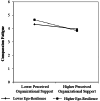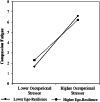The effect of perceived organizational support and ego-resilience on the relationship between occupational stressors and compassion fatigue in COVID-19 frontline nurses: a cross-sectional study in Sichuan, China
- PMID: 39529080
- PMCID: PMC11556187
- DOI: 10.1186/s12912-024-02473-z
The effect of perceived organizational support and ego-resilience on the relationship between occupational stressors and compassion fatigue in COVID-19 frontline nurses: a cross-sectional study in Sichuan, China
Abstract
Aim: To investigate the level of compassion fatigue among frontline nurses during the COVID-19 pandemic and to explore the relationship between occupational stressors and compassion fatigue among frontline nurses based on structural equation modelling.
Background: Three years into the COVID-19 pandemic, nurses on the frontlines of the battle were overwhelmed by affective and emotional inputs while caring for patients, and they generally experienced varying degrees of psychological problems. High levels of compassion fatigue can affect nursing quality and patient safety and therefore should be taken seriously by nursing managers.
Methods: A cross-sectional survey of 1432 frontline nurses in Sichuan Province, China, was conducted from January to March 2023 via convenience sampling methods. The General Information Questionnaire, the Nurses' Occupational Stressors Scale, the Ego-Resilience Scale, the Chinese version of the Compassion Fatigue Brief Scale, and the Perceived Organizational Support Scale were used to collect the data. Hypotheses were tested using structural equation models and bootstrapping methods.
Results: Nurse occupational stressors had a significant direct effect on compassion fatigue (B = 2.429, p < 0.001). Perceived organizational support exerted a mediating effect of 11.36% between occupational stressors and compassion fatigue. In addition, ego-resilience had a moderating role in the relationship between nurses' occupational stressors and compassion fatigue, between nurses' occupational stressors and perceived organizational support, and between perceived organizational support and compassion fatigue. Multiple linear regression analysis revealed that the most influential dimension of occupational stressors on compassion fatigue was work-family conflict (β = 0.253, p < 0.001), followed by organizational issues (β = 0.153, p < 0.001), work demands (β = 0.103, p < 0.001) and difficulty taking leave (β = 0.102, p < 0.001).
Conclusion: Nurse occupational stressors are positively associated with compassion fatigue and influence nurse compassion fatigue through the mediating effect of perceived organizational support and the moderating mechanism of ego-resilience. Managers can reduce nurses' compassion fatigue levels by reducing occupational stressors, promoting nurses' perceived organizational support, and fostering ego-resilience.
Implications for nursing management: This study further integrated the external and internal factors affecting compassion fatigue and constructed a structural equation model of the mechanism of compassion fatigue in frontline nurses, which has implications for the early identification and intervention of compassion fatigue in nurses.
Keywords: Compassion fatigue; Ego-resilience; Nurse; Occupational stressor; Perceived organizational support.
© 2024. The Author(s).
Conflict of interest statement
Figures





Similar articles
-
The mediating role of compassion fatigue between perceived organization support and caring behavior among outpatient nurses in China: a cross-sectional study.BMC Nurs. 2024 Dec 5;23(1):889. doi: 10.1186/s12912-024-02568-7. BMC Nurs. 2024. PMID: 39639315 Free PMC article.
-
Resilience as a mediator between compassion fatigue, nurses' work outcomes, and quality of care during the COVID-19 pandemic.Appl Nurs Res. 2021 Oct;61:151476. doi: 10.1016/j.apnr.2021.151476. Epub 2021 Jul 7. Appl Nurs Res. 2021. PMID: 34544570 Free PMC article.
-
Mediating Effect of Resilience Between Protective Organizational Practices and Professional Quality of Life: An International Perspective Among Nurses Caring for Patients With Emerging Infectious Diseases.West J Nurs Res. 2025 Jun;47(6):470-479. doi: 10.1177/01939459251324838. Epub 2025 Mar 24. West J Nurs Res. 2025. PMID: 40126908
-
Toward a Comprehensive Understanding of Nurses' Compassion Fatigue: A Meta-Integrative Qualitative Synthesis.J Adv Nurs. 2025 Jan 30. doi: 10.1111/jan.16785. Online ahead of print. J Adv Nurs. 2025. PMID: 39887482 Review.
-
Research progress on assessment tools related to occupational fatigue in nurses: a traditional review.Front Public Health. 2024 Dec 6;12:1508071. doi: 10.3389/fpubh.2024.1508071. eCollection 2024. Front Public Health. 2024. PMID: 39712300 Free PMC article. Review.
Cited by
-
Developing a crisis leadership evaluation system for Chinese nursing staff during major infectious disease emergencies: a modified Delphi study.BMC Nurs. 2025 Apr 15;24(1):423. doi: 10.1186/s12912-025-03050-8. BMC Nurs. 2025. PMID: 40234901 Free PMC article.
References
-
- Li L, Mao M, Wang S, Yin R, Yan H, Jin Y, Cheng Y. Posttraumatic growth in Chinese nurses and general public during the COVID-19 outbreak. Psychol Health Med. 2022;27(2):301–11. 10.1080/13548506.2021.1897148. - PubMed
-
- Rong-feng Z, Kai S, Fang X, Hong-zhou L. Development of COVID-19 pandemic prevention and control policies in China. Fudan Univ J Med Sci. 2024;01:016. 10.3969/j.issn.1672-8467.
-
- O’Callaghan EL, Lam L, Cant R, Moss C. Compassion satisfaction and compassion fatigue in Australian emergency nurses: a descriptive cross-sectional study. Int Emerg Nurs. 2020;48:100785. 10.1016/j.ienj.2019.06.008. - PubMed
-
- Greiner BS, Poskey GA. Fatigue: has it affected your Compassion? Neonatal Netw. 2017;36(5):289–93. 10.1891/0730-0832.36.5.289. - PubMed
Grants and funding
LinkOut - more resources
Full Text Sources

